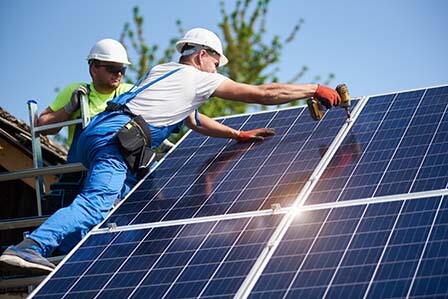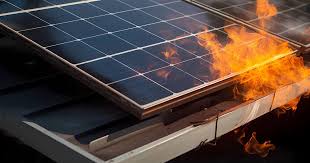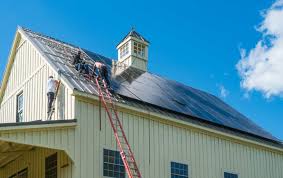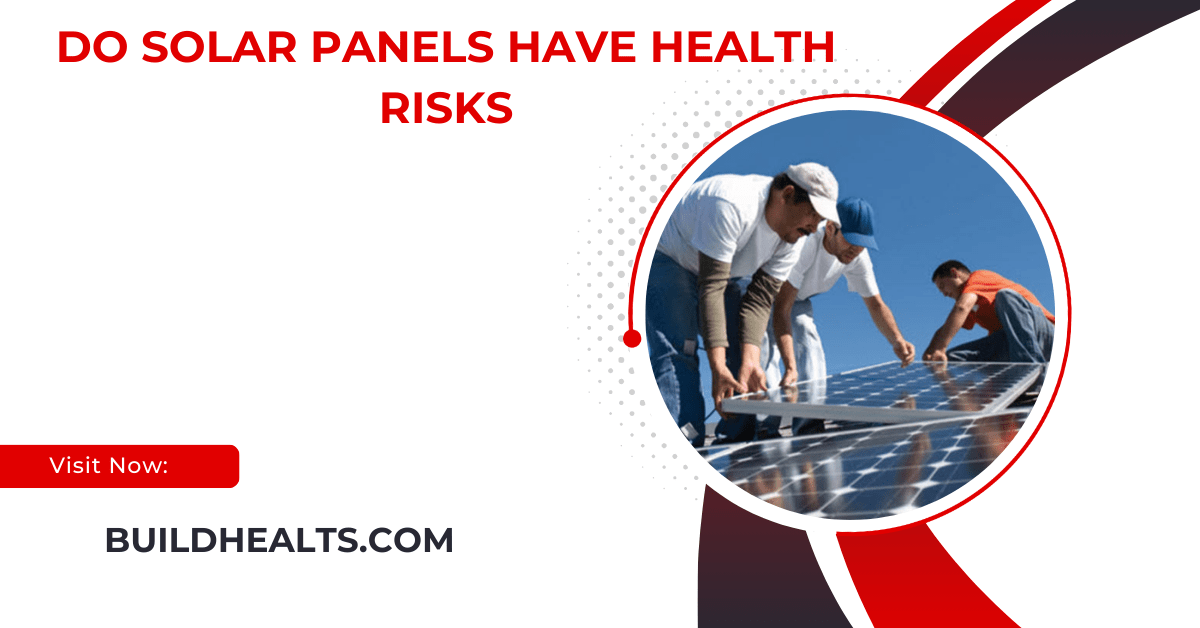Solar panels emit non-ionizing radiation and contain mostly non-toxic materials, posing minimal health risks. Proper installation and responsible disposal further reduce any potential hazards.
Solar panels have become an increasingly popular option for generating clean, renewable energy. As more homes and businesses adopt solar power, some people may wonder if solar panels pose any health risks.
This article will explore whether solar panels have health risks, how they work, and what precautions can be taken to ensure their safe use.
What Are Solar Panels?
How Solar Panels Work:

Solar panels are devices that convert sunlight into electricity. They are made up of photovoltaic (PV) cells, which are usually made from silicon. When sunlight hits the panels, the PV cells absorb the energy and create an electric current. This electricity can be used to power homes, businesses, and other applications.
Benefits of Solar Panels:
The benefits of solar panels are well-known. They provide a clean and sustainable source of energy, help reduce electricity bills, and contribute to lowering carbon emissions. Solar energy is renewable, meaning it doesn’t run out, unlike fossil fuels like coal, oil, and natural gas.
However, while the benefits are clear, some people still have concerns about whether solar panels pose health risks.
Do Solar Panels Emit Radiation?
Types of Radiation:
One of the most common concerns about solar panels is whether they emit harmful radiation. Solar panels produce electromagnetic fields (EMFs), but these are considered low-frequency radiation, which is not harmful to humans. There are two types of radiation:
- Ionizing Radiation: This type of radiation has enough energy to remove tightly bound electrons from atoms, creating ions. It is known to cause harm to human cells and DNA. Examples include X-rays and gamma rays.
- Non-Ionizing Radiation: This type of radiation is low-energy and does not cause ionization. Solar panels emit non-ionizing radiation, which is the same type of radiation emitted by household devices like microwaves, cell phones, and Wi-Fi routers.
Also read: When Does Nutex Health Inc Do Earnings Report Come Out – A Complete Guide!
Are EMFs from Solar Panels Dangerous?
The EMFs produced by solar panels and their components, such as inverters, are minimal and fall well below safety standards set by regulatory bodies like the World Health Organization (WHO). Research indicates that the low levels of EMFs from solar panels do not pose any significant health risks.
In short, while solar panels do emit some radiation, it is non-ionizing and considered harmless.
Toxic Materials in Solar Panels
Are Solar Panels Made from Toxic Materials?
Another concern is whether the materials used to make solar panels are toxic. Solar panels are primarily made from silicon, glass, and aluminum, all of which are non-toxic materials. However, some solar panels may contain trace amounts of heavy metals, such as lead or cadmium, which could be harmful if not properly handled.
- Lead: Lead is sometimes used in the soldering process for solar panels. Exposure to lead can be harmful, particularly for children, as it can affect brain development and cause other health issues.
- Cadmium: Some thin-film solar panels use cadmium telluride, a compound that contains cadmium, a toxic heavy metal. Long-term exposure to cadmium can lead to lung and kidney damage.
Risk of Exposure:
The risk of exposure to these toxic materials is very low under normal operating conditions. Solar panels are designed to be durable and withstand environmental factors, which means they are not likely to release harmful substances during their use.
The real concern comes at the end of their lifespan, during disposal or recycling. If not properly managed, broken panels could potentially release small amounts of these toxic substances into the environment.
Fire and Electrical Risks:

Can Solar Panels Cause Fires?
Like any electrical device, solar panels can pose a fire risk if not properly installed or maintained. Faulty wiring, incorrect installation, or malfunctioning equipment can increase the risk of electrical fires. However, the overall risk of solar panels causing a fire is extremely low when they are installed by licensed professionals and regularly inspected.
Precautions to Reduce Fire Risk:
To reduce the risk of fire, it is important to follow safety guidelines and hire certified professionals to install the solar panel system. Regular inspections and maintenance can also help prevent potential issues that could lead to fires.
- Professional Installation: Always ensure that the installation is done by a licensed and experienced solar contractor.
- Regular Inspections: Have your solar system inspected regularly to check for any damage or wear and tear that could cause electrical problems.
- Fire Safety Measures: Make sure that the system is equipped with safety devices, such as fuses and circuit breakers, to protect against electrical faults.
Health Concerns from Solar Panel Manufacturing:
Environmental Impact of Manufacturing:
The process of manufacturing solar panels does have some environmental and health-related impacts. Producing solar panels requires the use of energy, water, and chemicals, which can contribute to pollution. Factories that produce solar panels may emit greenhouse gases and other pollutants, which can affect air quality and contribute to health problems, especially for workers.
However, the environmental and health risks associated with solar panel manufacturing are much lower than those from producing energy using fossil fuels. Solar energy production itself does not emit harmful pollutants, and the overall impact of using solar power is far cleaner and healthier than traditional energy sources.
Also read: What is Tier 1 Home Health in Arkansas – A Complete Guide!
Worker Safety:
Factory workers involved in the production of solar panels may be exposed to chemicals and hazardous materials, but safety regulations and proper protective equipment can minimize these risks. Companies that manufacture solar panels are required to follow safety guidelines to protect their workers from exposure to harmful substances.
End-of-Life Concerns:
Solar Panel Disposal and Recycling:
One of the growing concerns about solar panels is how they are disposed of at the end of their lifespan. Solar panels can last for 25 to 30 years, but after that, they need to be disposed of or recycled. If not handled properly, discarded solar panels could release toxic materials, such as lead and cadmium, into the environment.
Recycling programs for solar panels are still developing, but they are essential to reducing the environmental impact of solar energy systems. Recycling helps recover valuable materials like silicon, glass, and metals, and reduces the risk of toxic substances being released into landfills.
Safe Disposal Methods:
- Recycling Facilities: It is important to send old solar panels to dedicated recycling facilities that can safely recover and dispose of the materials.
- Manufacturer Take-Back Programs: Some solar panel manufacturers offer take-back programs, where they collect old panels and ensure they are properly recycled.
Solar Panel Benefits Outweigh the Risks:

Minimal Health Risks:
The health risks associated with solar panels are minimal compared to the benefits they offer. The low levels of radiation emitted by solar panels do not pose a threat to human health, and the materials used in their production are generally safe under normal operating conditions.
Clean Energy Advantages:
Solar panels provide a clean and renewable energy source that reduces dependence on fossil fuels. By reducing air pollution and greenhouse gas emissions, solar energy has a positive impact on public health. The overall benefits of solar energy far outweigh the potential risks, making it a safe and environmentally friendly option for generating electricity.
FAQ’s
1. Do solar panels emit harmful radiation?
No, solar panels emit low-frequency, non-ionizing radiation, which is not harmful to humans.
2. Are the materials in solar panels toxic?
Solar panels are mostly made of non-toxic materials like silicon and aluminum, but some may contain small amounts of toxic metals like lead or cadmium.
3. Can solar panels cause fires?
The risk is very low when properly installed by licensed professionals and maintained with regular inspections.
4. Is solar panel manufacturing harmful to the environment?
While the manufacturing process has some environmental impact, it is far cleaner than fossil fuel-based energy production.
5. How should old solar panels be disposed of?
Recycling facilities or manufacturer take-back programs should be used to safely dispose of or recycle old panels.
Conclusion
In conclusion, solar panels pose minimal health risks, primarily due to their low levels of non-ionizing radiation and the use of mostly non-toxic materials. With proper installation and responsible disposal, any potential hazards can be effectively managed. Ultimately, the benefits of solar energy significantly outweigh these minimal risks.




